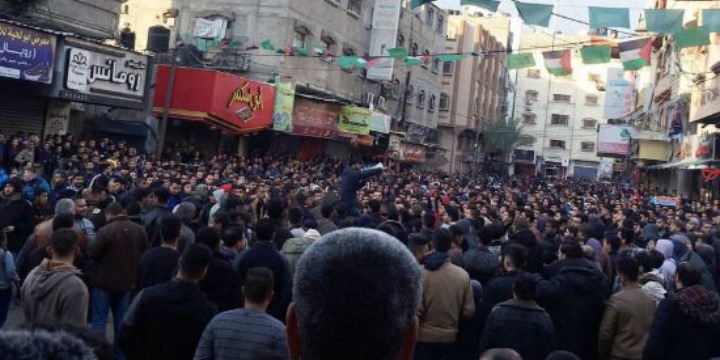A Moment of Hope — and Change — for Gaza?
 by Noah Phillips
by Noah Phillips

Palestinians protest against Hamas in Gaza. Photo: Twitter Screenshot / Israel Prime Minister’s Arab Media Spokesman.
Beginning on March 14, a series of protests against the quality of life under Hamas rule have erupted in the Gaza Strip. These have been the largest anti-government demonstrations since Hamas took control of Gaza in 2007.
Thousands of protesters have taken to the streets, despite the violent dispersion tactics employed by Hamas. The protests have, by and large, been coordinated through social media and the hashtag #WeWanttoLive — an allusion to the obscene living conditions endured by Gazans under Hamas rule.
Amnesty International — an organization notorious for its anti-Israel bias and anti-Israel attacks — has vocally condemned Hamas’ violent suppression efforts. Amnesty official Saleh Hijazi said that “the crackdown on freedom of expression and the use of torture in Gaza has reached alarming new levels. Over the past few days, we have seen shocking human rights violations carried out by Hamas security forces against peaceful protesters, journalists, and rights workers.”
One research consultant with Amnesty was detained for hours by Hamas forces and aggressively discouraged from pursuing “human rights research.” Reportedly, more than 1,000 arrests have been made, including 42 local journalists, as protests have broken out in approximately 25 locations. Images show the streets of Gaza ablaze and smoking, while stories relayed by social media convey the widespread nature of the protests — defeating Hamas’ efforts to keep the protests under wraps.
Hamas’ corruption and poor governance has led to an unemployment rate of well over 50 percent for working-age citizens, in one of the fastest-growing populations globally. Clean water is a scarcity — more than 90 percent is undrinkable — and most Gazans subsist on less than $2 a day. In spite of such staggering statistics, Hamas has built a robust military force to accomplish their avowed goal of destroying Israel, spending a reported average of $100 million annually on warfare.
Yet despite Hamas’ unconscionable allocation of funds for military purposes (including funds received for humanitarian aid), the group’s popularity among the populace has remained immense and has at times increased in both the West Bank and Gaza, per the Palestine Center for Policy and Survey Research.
And while Hamas has evidently squandered Gaza’s resources on a genocidal mission, shockingly, the prior consensus among Gazans was that Israel was at fault for their economic, social, and political woes.
But given the current trajectory of the protests, it’s not far off to expect certain fundamental changes for both Hamas and the societal beliefs of Gazans.
Already, the protests have further alienated the Palestinian Authority (PA) and Hamas, after the PA was alleged to have played a part in coordinating the protests. While Fatah officials have condoned the protests as acts against Hamas repression, they categorically deny actually facilitating them.
With the recent violence and tension between Hamas and the PA not likely to blow over soon, continued infighting among the Palestinian leadership will only spur protesters on, as Hamas resources are spread thin and it continues to try and suppress the protests.
Finally, these protests (and Hamas’ response to them) might lead to a larger opposition to Hamas rule and a questioning of the group’s authority and goals — if not a more favorable view of Israel — by Gazans. In either case, Israel only stands to gain from the changing opinion of Palestinians.
This is a time like no other for residents of Gaza to glimpse the reality of Hamas, as the terror group takes action against its own citizens. And it is a chance to shape their future through sustained protest — a remarkable possibility for an area marred by poverty and instability.
 Police Stop Anti-Zionist Agitators From Accessing Florida University President’s Home as Students Revolt Nationwide
Police Stop Anti-Zionist Agitators From Accessing Florida University President’s Home as Students Revolt Nationwide Nearly One in Five Young People Sympathize With Hamas, 29% Say US Should Reduce or End Alliance With Israel: Poll
Nearly One in Five Young People Sympathize With Hamas, 29% Say US Should Reduce or End Alliance With Israel: Poll Ilhan Omar Silent After Daughter’s Arrest, Suspension for Role in Columbia University Anti-Israel Protest
Ilhan Omar Silent After Daughter’s Arrest, Suspension for Role in Columbia University Anti-Israel Protest Cultural Center Backed by Iran’s Revolutionary Guard Plans to Produce Films About Attack on Israel
Cultural Center Backed by Iran’s Revolutionary Guard Plans to Produce Films About Attack on Israel How Does Ilhan Omar Really Feel About Iran?
How Does Ilhan Omar Really Feel About Iran? This Passover, Combine Respect for Tradition with the Courage to Innovate
This Passover, Combine Respect for Tradition with the Courage to Innovate Israel’s Iran Attack Carefully Calibrated After Internal Splits, US Pressure
Israel’s Iran Attack Carefully Calibrated After Internal Splits, US Pressure Palestinian Cameramen Exposed in New Footage Documenting Oct. 7 Atrocities Side by Side with Terrorists
Palestinian Cameramen Exposed in New Footage Documenting Oct. 7 Atrocities Side by Side with Terrorists US Money to Convicted Terrorists; US Training to Aspiring Terrorists
US Money to Convicted Terrorists; US Training to Aspiring Terrorists Man Arrested in Paris After Iran Consulate Incident
Man Arrested in Paris After Iran Consulate Incident



 Palestinian Cameramen Exposed in New Footage Documenting Oct. 7 Atrocities Side by Side with Terrorists
Palestinian Cameramen Exposed in New Footage Documenting Oct. 7 Atrocities Side by Side with Terrorists How Does Ilhan Omar Really Feel About Iran?
How Does Ilhan Omar Really Feel About Iran? Amazon Pulls Book by Hamas Leader Yahya Sinwar Referencing Oct. 7 Attacks After UK Lawyers Intervene
Amazon Pulls Book by Hamas Leader Yahya Sinwar Referencing Oct. 7 Attacks After UK Lawyers Intervene Tehran Signals No Retaliation Against Israel After Drones Attack Iran
Tehran Signals No Retaliation Against Israel After Drones Attack Iran US Money to Convicted Terrorists; US Training to Aspiring Terrorists
US Money to Convicted Terrorists; US Training to Aspiring Terrorists